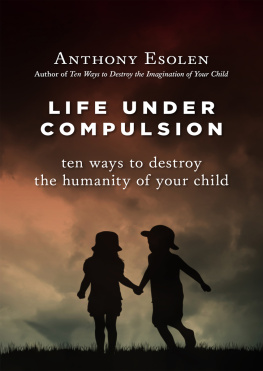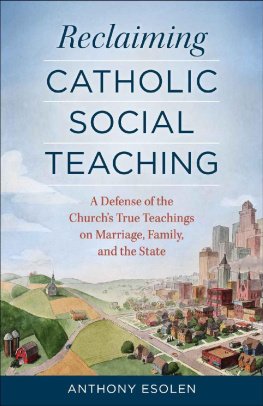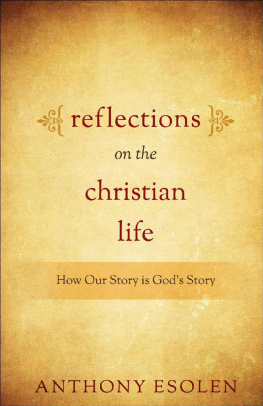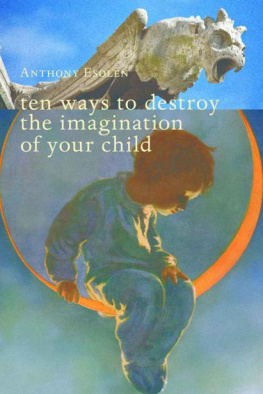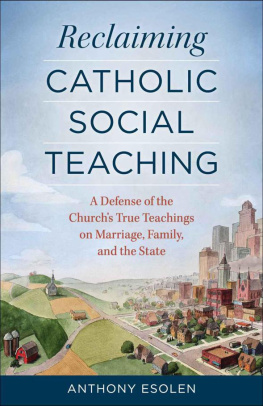Anthony Esolen - Defending Boyhood: How Building Forts, Reading Stories, Playing Ball, and Praying to God Can Change the World
Here you can read online Anthony Esolen - Defending Boyhood: How Building Forts, Reading Stories, Playing Ball, and Praying to God Can Change the World full text of the book (entire story) in english for free. Download pdf and epub, get meaning, cover and reviews about this ebook. year: 2019, publisher: TAN Books, genre: Art. Description of the work, (preface) as well as reviews are available. Best literature library LitArk.com created for fans of good reading and offers a wide selection of genres:
Romance novel
Science fiction
Adventure
Detective
Science
History
Home and family
Prose
Art
Politics
Computer
Non-fiction
Religion
Business
Children
Humor
Choose a favorite category and find really read worthwhile books. Enjoy immersion in the world of imagination, feel the emotions of the characters or learn something new for yourself, make an fascinating discovery.

- Book:Defending Boyhood: How Building Forts, Reading Stories, Playing Ball, and Praying to God Can Change the World
- Author:
- Publisher:TAN Books
- Genre:
- Year:2019
- Rating:5 / 5
- Favourites:Add to favourites
- Your mark:
- 100
- 1
- 2
- 3
- 4
- 5
Defending Boyhood: How Building Forts, Reading Stories, Playing Ball, and Praying to God Can Change the World: summary, description and annotation
We offer to read an annotation, description, summary or preface (depends on what the author of the book "Defending Boyhood: How Building Forts, Reading Stories, Playing Ball, and Praying to God Can Change the World" wrote himself). If you haven't found the necessary information about the book — write in the comments, we will try to find it.
Anthony Esolen: author's other books
Who wrote Defending Boyhood: How Building Forts, Reading Stories, Playing Ball, and Praying to God Can Change the World? Find out the surname, the name of the author of the book and a list of all author's works by series.
Defending Boyhood: How Building Forts, Reading Stories, Playing Ball, and Praying to God Can Change the World — read online for free the complete book (whole text) full work
Below is the text of the book, divided by pages. System saving the place of the last page read, allows you to conveniently read the book "Defending Boyhood: How Building Forts, Reading Stories, Playing Ball, and Praying to God Can Change the World" online for free, without having to search again every time where you left off. Put a bookmark, and you can go to the page where you finished reading at any time.
Font size:
Interval:
Bookmark:
BOYHOOD
Ball, and Praying to God Can Change the World
Anthony Esolen, PhD
TAN Books
Charlotte, North Carolina
Copyright 2019 Anthony Esolen
All rights reserved. With the exception of short excerpts used in articles and critical reviews, no part of this work may be reproduced, transmitted, or stored in any form whatsoever, printed or electronic, without the prior written permission of the publisher.
Unless otherwise noted, Scripture Quotations are from the Revised Standard Version of the BibleSecond Catholic Edition (Ignatius Edition), copyright 2006 National Council of the Churches of Christ in the United States of America. Used by permission. All rights reserved.
Scripture quotations marked KJV are from the King James Version.
Excerpts from the English translation of the Catechism of the Catholic Church for use in the United States of America copyright 1994, United States Catholic Conference, Inc.Libreria Editrice Vaticana. Used with permission.
Cover image: Baseball home base by Karen Geswein Photography / Shutterstock. Cover design by Caroline K. Green.
Library of Congress Control Number: 2018966063
ISBN: 978-1-5051-1242-9
Published in the United States by
TAN Books
P.O. Box 410487
Charlotte, NC 28241
www.TANBooks.com
Printed in the United States of America
For my father-in-law, Herb, the biggest kid I know
W ho would think that a book needs to be written defending boyhood. Alas, given the sorry state of our gelded culture, the need has never been so acute. Our national emasculation is obvious and without precedent in the history of a great country founded by men. Even many a male lamely prattles on about the newest malady supposedly plaguing the zeitgeist: toxic masculinity (read: masculinity).
Yes, a book defending boyhood is direly needed. And Tony Esolen is just the guy to do it. In a Western world increasingly lacking men with chests, Esolen is a man with courage, unafraid to stand athwart the modernists yelling halt. Esolen himself has been hounded by the wolves of political correctness who have pursued him hungrily. He doesnt care. Hes nothing if not fearless.
This book is a counterpunch from what is today the new counter-culture. The likes of Esolen and the people at TAN Books/Saint Benedict Press and, frankly, any serious, traditional Catholic, now represent just that: a counter-culture. They are the sentinels, beckoning us to return to that which is time-tested and true, whether theyve thought of themselves that way or not. The mob of radical transformers have sought to remake marriage in their own image, sexuality in their own image, gender in their own image, and even boyhood in their own image. That is to say, of course, that they desire a boyhood that isnt actually boyhood.
What does it really mean to be a boy? What should it mean to be a boy?
My boyhood was over forty years ago when boys were, well, boys. Like Esolen, who opens this book with joyful (but imperfect) memories of his Italian grandmothers house, I constantly harken back to joyful (but imperfect) memories of my Italian grandmothers house (my mother is 100 percent Italian). My kids will attest to that. A million times theyve heard me begin, At my grandmas house I so often fondly retreat to those days in a tiny house overflowing with kids, grandkids, aunts, uncles, the thriving humanity, the loud voices, the crazy kitchen, the card games and Scrabble games until 4:00 a.m., and, of course, the food. People had their places, their roles, and we all genuinely loved it. Yes, there were shouts, disagreements, blow-ups, but there was laughter, joy, stable marriages.
There was, as Tony Esolen says repeatedly in this book, a tranquility of order to it all.
I could go on and on with boyhood memories. Well beyond my grandmas house, my memories of boy-time activities range from the outright wild to the patently stupid. Such is the life of boys.
I remember six or seven of us camping out in the woods with only sleeping bags in what turned out to be the first snowfall of the year. We nearly froze to death. My dad knew, but he let us go. It was part of being a boy and becoming a man. Only after urging from my mom (I later learned) did my dad get in the truck to fetch us.
Turning the heat up considerably, Ill never forget damn near starting a small forest fire outside Brian Flemings house (we called him Flem) one summer afternoon as we experimented with igniting various sets of brush in an overgrown lot. That was stupid. I still cringe at the thought of J. T. Zulick and I trying to smash his dads shotgun shells with a hammer on my back porch before someone mercifully saved us. That was really stupid. And we regularly played an infamous type of football game whereby we tossed the ball in the air and obliterated the first sucker who dared to pick it up. (A worse fate awaited the sad sack who didnt do his boy-duty and pick up the ball, which was required of whoever was closest to where it landed.) I would here divulge the commonly known name for this game (universally acknowledged among boys of the era as starting with the word Smear), but I dont want the incensed drama-queens of the new thought police goose-stepping to my house to arrest my children for my unforgivable sins of the 70s.
Now I have boys of my own, five of them, one of which, John, I could turn into the next Calvin of Calvin & Hobbes legend, if comic strips were my business. The kid provides daily material. Amid a pause in writing this foreword, I heard a crash in the woods. I trekked nervously toward the noise, calling out if everything was alright. Its okay, daddy, responded John. We just pushed down a tree.
No one died.
I lured the cabal of boys closer to the house with important news that my youngest, Ben, had just discovered a severed rabbits foot near the porch. Upon inspection, John enthusiastically proclaimed that the dismembered appendage was actually a ripped apart and stretched out mutant dead squirrels head. It was quite an exaggeration, but the other boys all seemed excitedly onboard for that creative prognosis. There were no dissenters.
All of that is part of being a boy, but its hardly a full picture. Enter Tony Esolen with his own storytelling, and his great common sense. His flashes of memory and strokes of pen are both entertaining and edifying, as is his command of everything from the arts to theology to pop culture. He starts with Augustine and St. Paul and finishes with St. Paul and Caravaggio. In between, in classic Esolen prose and style, he sprinkles in discourses ranging from the young Jesuss relationship with his parents to the grown Jesuss interactions with his apostles, as well as numerous literary allusions and pop-culture references, whether remarking on Tennyson or The Twilight Zone, Milton and Shakespeare and Dante, Tiger Woods and C. S. Lewis and George S. Patton, Huckleberry Finn and Horatio Storer, Rudyard Kipling and Carl Sandburg, Michelangelo and Saint Damien of Molokai, Pier Giorgio and Dominic Savio, Laura Ingalls Wilder and Odysseus, or Tom Sawyer or Clifton Webb or Jason McCord. The latter of these characters comes from an old western TV show, Branded, starring Chuck Connors, a mans man. There, Esolen invokes Saint Josemara Escrivs lesser-known exhortation: Be a man.
It is this kind of integration of higher ideas with his wide-ranging knowledge of everything from the best poetry and books of the Western tradition to films and sports that always makes Tony Esolens writing so engaging. His examination is more philosophical and uplifting than my personal musings of a rube growing up in Western Pennsylvania smashing shotgun shells. And yet he likewise looks back wistfully at vivid stories from his own youthagain, so many of which took me back to my own childhood.
Font size:
Interval:
Bookmark:
Similar books «Defending Boyhood: How Building Forts, Reading Stories, Playing Ball, and Praying to God Can Change the World»
Look at similar books to Defending Boyhood: How Building Forts, Reading Stories, Playing Ball, and Praying to God Can Change the World. We have selected literature similar in name and meaning in the hope of providing readers with more options to find new, interesting, not yet read works.
Discussion, reviews of the book Defending Boyhood: How Building Forts, Reading Stories, Playing Ball, and Praying to God Can Change the World and just readers' own opinions. Leave your comments, write what you think about the work, its meaning or the main characters. Specify what exactly you liked and what you didn't like, and why you think so.

